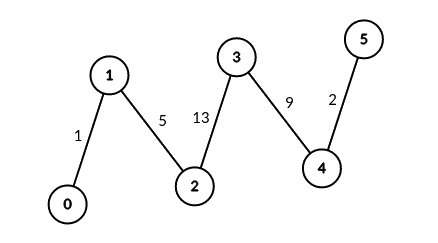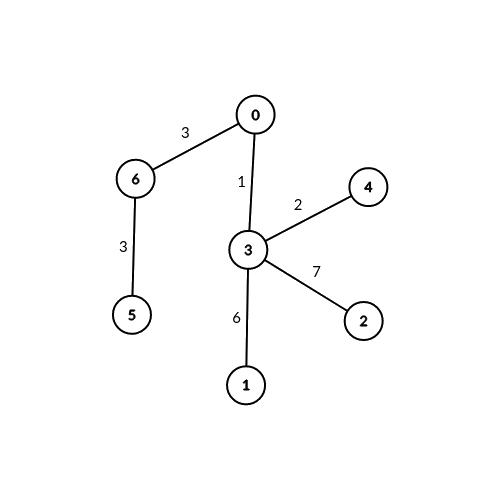LeetCode-in-Java
3067. Count Pairs of Connectable Servers in a Weighted Tree Network
Medium
You are given an unrooted weighted tree with n vertices representing servers numbered from 0 to n - 1, an array edges where edges[i] = [ai, bi, weighti] represents a bidirectional edge between vertices ai and bi of weight weighti. You are also given an integer signalSpeed.
Two servers a and b are connectable through a server c if:
a < b,a != candb != c.- The distance from
ctoais divisible bysignalSpeed. - The distance from
ctobis divisible bysignalSpeed. - The path from
ctoband the path fromctoado not share any edges.
Return an integer array count of length n where count[i] is the number of server pairs that are connectable through the server i.
Example 1:

Input: edges = [[0,1,1],[1,2,5],[2,3,13],[3,4,9],[4,5,2]], signalSpeed = 1
Output: [0,4,6,6,4,0]
Explanation: Since signalSpeed is 1, count[c] is equal to the number of pairs of paths that start at c and do not share any edges.
In the case of the given path graph, count[c] is equal to the number of servers to the left of c multiplied by the servers to the right of c.
Example 2:

Input: edges = [[0,6,3],[6,5,3],[0,3,1],[3,2,7],[3,1,6],[3,4,2]], signalSpeed = 3
Output: [2,0,0,0,0,0,2]
Explanation: Through server 0, there are 2 pairs of connectable servers: (4, 5) and (4, 6).
Through server 6, there are 2 pairs of connectable servers: (4, 5) and (0, 5).
It can be shown that no two servers are connectable through servers other than 0 and 6.
Constraints:
2 <= n <= 1000edges.length == n - 1edges[i].length == 30 <= ai, bi < nedges[i] = [ai, bi, weighti]1 <= weighti <= 1061 <= signalSpeed <= 106- The input is generated such that
edgesrepresents a valid tree.
Solution
import java.util.ArrayList;
@SuppressWarnings("unchecked")
public class Solution {
private ArrayList<Integer>[] adj;
public int[] countPairsOfConnectableServers(int[][] edges, int signalSpeed) {
int n = edges.length + 1;
adj = new ArrayList[n];
for (int i = 0; i < n; i++) {
adj[i] = new ArrayList<>();
}
for (int[] edge : edges) {
int u = edge[0];
int v = edge[1];
int w = edge[2];
adj[u].add(v);
adj[v].add(u);
adj[u].add(w);
adj[v].add(w);
}
int[] res = new int[n];
for (int i = 0; i < n; i++) {
if (adj[i].size() > 2) {
ArrayList<Integer> al = new ArrayList<>();
for (int j = 0; j < adj[i].size(); j += 2) {
int[] cnt = new int[1];
dfs(adj[i].get(j), i, adj[i].get(j + 1), cnt, signalSpeed);
al.add(cnt[0]);
}
int sum = 0;
for (int j : al) {
res[i] += (sum * j);
sum += j;
}
}
}
return res;
}
void dfs(int node, int par, int sum, int[] cnt, int ss) {
if (sum % ss == 0) {
cnt[0]++;
}
for (int i = 0; i < adj[node].size(); i += 2) {
int child = adj[node].get(i);
if (child != par) {
dfs(child, node, sum + adj[node].get(i + 1), cnt, ss);
}
}
}
}

